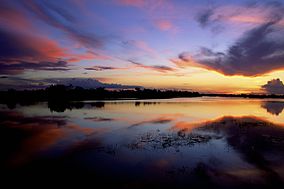Jaú National Park
| Jaú National Park | |
|---|---|
| Parque Nacional do Jaú | |
|
IUCN category II (national park)
|
|

Flooded forest in the park
|
|
| Nearest city | Manaus, Amazonas |
| Coordinates | 2°18′S 63°03′W / 2.30°S 63.05°WCoordinates: 2°18′S 63°03′W / 2.30°S 63.05°W |
| Area | 2,367,333 ha (9,140.32 sq mi) |
| Designation | National park |
| Created | 24 September 1980 |
| Administrator | ICMBio |
| World Heritage Site |
UNESCO World Heritage Site
Central Amazon Conservation Complex |
| Name as inscribed on the World Heritage List | |
| Type | Natural |
| Criteria | ix, x |
| Reference | 998 |
| UNESCO region | Latin America and the Caribbean |
| Inscription history | |
| Inscription | 2000 (24th Session) |
| Extensions | 2003 |
The Jau national park (Portuguese: Parque Nacional do Jaú) is a national park located in the state of Amazonas, Brazil. It is the largest forest reserve in South America, and part of a World Heritage Site.
The name "Jaú" comes from that of one of the largest fish in Brazil, the gilded catfish or jau (Zungaro zungaro), after which the main river of the park is named. The park is in the Amazon biome in the Japurá-Solimões-Negro moist forests ecoregion. It covers an area of 2,367,333 hectares (5,849,810 acres). It was created by decree 85.200 of 24 September 1980. It is administered by the Chico Mendes Institute for Biodiversity Conservation. It covers parts of the municipalities of Barcelos, Codajás and Novo Airão in the state of Amazonas.
The park is one of the largest protected areas in Brazil. It is about 220 kilometres (140 mi) northwest of Manaus and contains the entire Jaú River basin between the Unini River to the north and the Carabinani River to the south. All three rivers flow east to enter the right bank of the Rio Negro. The eastern part of the park adjoins the Rio Unini Extractive Reserve to the north, which runs along the opposite bank of the Unini River. The park is bounded to the northwest by the Amanã Sustainable Development Reserve. To the east, near the Rio Negro, the park adjoins the Rio Negro State Park North Section to the south.
...
Wikipedia

